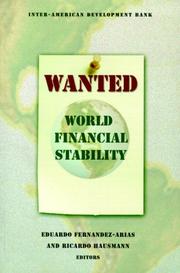| Listing 1 - 10 of 13 | << page >> |
Sort by
|
Book
ISBN: 1462333729 1452758263 1282109782 1451903545 9786613802675 Year: 2004 Publisher: Washington, D.C. : International Monetary Fund,
Abstract | Keywords | Export | Availability | Bookmark
 Loading...
Loading...Choose an application
- Reference Manager
- EndNote
- RefWorks (Direct export to RefWorks)
India's fiscal problem has deep roots in its federal fiscal system, where multiple players find it difficult to coordinate adjustment. The size and closed nature of the Indian economy, aided by its deep domestic capital market and large captive pool of domestic savings, has disguised the cost of fiscal laxity and complicated the building of a consensus on reform. The new fiscal responsibility act establishes a new rules-based system to overcome this coordination failure. To strengthen the framework, we recommend an autonomous scorekeeper and the extension of similar rules to the state governments as part of a comprehensive reform of the federal system.
Fiscal policy --- Budget deficits --- Structural adjustment (Economic policy) --- Debts, Public --- Deficits, Budget --- Budget --- Deficit financing --- Budgeting --- Public Finance --- Fiscal Policy --- Structure, Scope, and Performance of Government --- National Budget --- Budget Systems --- State and Local Borrowing --- Intergovernmental Relations --- Federalism --- Secession --- Debt --- Debt Management --- Sovereign Debt --- National Government Expenditures and Related Policies: General --- Public finance & taxation --- Budgeting & financial management --- Macroeconomics --- Budget planning and preparation --- Public debt --- Expenditure --- Government debt management --- Public financial management (PFM) --- Expenditures, Public --- India

ISBN: 0226194558 9786612584688 0226194574 1282584685 9780226194578 9780226194554 Year: 2005 Publisher: Chicago : University of Chicago Press,
Abstract | Keywords | Export | Availability | Bookmark
 Loading...
Loading...Choose an application
- Reference Manager
- EndNote
- RefWorks (Direct export to RefWorks)
Recent crises in emerging markets have been heavily driven by balance-sheet or net-worth effects. Episodes in countries as far-flung as Indonesia and Argentina have shown that exchange rate adjustments that would normally help to restore balance can be destabilizing, even catastrophic, for countries whose debts are denominated in foreign currencies. Many economists instinctually assume that developing countries allow their foreign debts to be denominated in dollars, yen, or euros because they simply don't know better. Presenting evidence that even emerging markets with strong policies and institutions experience this problem, Other People's Money recognizes that the situation must be attributed to more than ignorance. Instead, the contributors suggest that the problem is linked to the operation of international financial markets, which prevent countries from borrowing in their own currencies. A comprehensive analysis of the sources of this problem and its consequences, Other People's Money takes the study one step further, proposing a solution that would involve having the World Bank and regional development banks themselves borrow and lend in emerging market currencies.
Money. Monetary policy --- International finance --- Developing countries --- Capital movements - Developing countries. --- Capital movements -- Developing countries. --- Debts, External - Developing countries. --- Debts, External -- Developing countries. --- Finance - Developing countries. --- Finance -- Developing countries. --- Monetary policy -- Developing countries. --- Finance --- Business & Economics --- International Finance --- Capital movements --- -Debts, External --- -Finance --- -Monetary policy --- -332.042091724 --- Monetary management --- Economic policy --- Currency boards --- Money supply --- Funding --- Funds --- Economics --- Currency question --- Debts, Foreign --- Debts, International --- External debts --- Foreign debts --- International debts --- Debt --- Investments, Foreign --- Capital flight --- Capital flows --- Capital inflow --- Capital outflow --- Flight of capital --- Flow of capital --- Movements of capital --- Balance of payments --- Foreign exchange --- Debts, External --- Monetary policy --- International banking --- Investments & investing --- HG 3810-4000 Foreign exchange --- E-books --- finance, financial, economics, economy, economical, wealth, income, monetary, marketplace, debt, crisis, 21st century, contemporary, modern, developing, country, countries, currency, foreign, international, policy, analysis, cost, effect, study, academic, scholarly, research, banks, banking, currencies, essay collection, fiscal, college, university.

ISBN: 1886938040 Year: 1996 Publisher: Washington, D.C. Inter-American Development Bank
Abstract | Keywords | Export | Availability | Bookmark
 Loading...
Loading...Choose an application
- Reference Manager
- EndNote
- RefWorks (Direct export to RefWorks)
Book
ISBN: 0271064625 0271060913 9780271064628 9780271064642 0271064641 9780271060910 9780271056319 0271056312 0271056320 9780271056326 Year: 2014 Publisher: University Park, Pennsylvania : Pennsylvania State University Press,
Abstract | Keywords | Export | Availability | Bookmark
 Loading...
Loading...Choose an application
- Reference Manager
- EndNote
- RefWorks (Direct export to RefWorks)
At the beginning of the twentieth century, Venezuela had one of the poorest economies in Latin America, but by 1970 it had become the richest country in the region and one of the twenty richest countries in the world, ahead of countries such as Greece, Israel, and Spain. Between 1978 and 2001, however, Venezuela’s economy went sharply in reverse, with non-oil GDP declining by almost 19 percent and oil GDP by an astonishing 65 percent. What accounts for this drastic turnabout? The editors of Venezuela Before Chávez, who each played a policymaking role in the country’s economy during the past two decades, have brought together a group of economists and political scientists to examine systematically the impact of a wide range of factors affecting the economy’s collapse, from the cost of labor regulation and the development of financial markets to the weakening of democratic governance and the politics of decisions about industrial policy. Aside from the editors, the contributors are Omar Bello, Adriana Bermúdez, Matías Braun, Javier Corrales, Jonathan Di John, Rafael Di Tella, Javier Donna, Samuel Freije, Dan Levy, Robert MacCulloch, Osmel Manzano, Francisco Monaldi, María Antonia Moreno, Daniel Ortega, Michael Penfold, José Pineda, Lant Pritchett, Cameron A. Shelton, and Dean Yang.
Financial crises --- Crashes, Financial --- Crises, Financial --- Financial crashes --- Financial panics --- Panics (Finance) --- Stock exchange crashes --- Stock market panics --- Crises --- Venezuela --- Venesuėla --- Republic of Venezuela --- República de Venezuela --- Bolivarian Republic of Venezuela --- República Bolivariana de Venezuela --- Gobierno Bolivariano --- Estados Unidos de Venezuela --- Венесуэла --- Баліварыянская Рэспубліка Венесуэла --- Balivaryi︠a︡nskai︠a︡ Rėspublika Venesuėla --- Венецуела --- Venet︠s︡uela --- Боливарска република Венецуела --- Bolivarska republika Venet︠s︡uela --- Βενεζουέλα --- Venezouela --- Μπολιβαριανή Δημοκρατία της Βενεζουέλας --- Bolivarianē Dēmokratia tēs Venezouelas --- 베네수엘라 --- Penesuella --- 베네수엘라 볼리바르 공화국 --- Penesuella Bollibarŭ Konghwaguk --- Венесуэл --- Venesuėl --- Bu̇gd Naĭramdakh Bolivaryn Venesuėl Uls --- ベネズエラ --- Benezuera --- ベネズエラ・ボリバル共和国 --- Benezuera Boribaru Kyōwakoku --- Боливарианская Республика Венесуэла --- Bolivarianskai︠a︡ Respublika Venesuėla --- Venecuela --- Bolivarska Republika Venecuela --- Venezuelan bolivariaaninen tasavalta --- Bolivarianska republiken Venezuela --- Bolivarcı Venezuela Cumhuriyeti --- Wenesuela --- Wenesuela Boliwar Respublikasy --- Венесуела --- Боліварианська Республіка Венесуела --- Bolivaryansʹka Respublika Venesuela --- 委內瑞拉 --- Weineiruila --- 委內瑞拉玻利瓦爾共和國 --- Weineiruila Boliwa'er Gongheguo --- Economic policy. --- Economic conditions --- E-books --- Financial crises. --- Venezuela.

ISBN: 1886938121 Year: 1996 Publisher: Washington Inter-American Development Bank
Abstract | Keywords | Export | Availability | Bookmark
 Loading...
Loading...Choose an application
- Reference Manager
- EndNote
- RefWorks (Direct export to RefWorks)
Book
ISBN: 0262525429 1306322324 0262317710 9781461956631 1461956633 9780262317719 9781306322324 9780262525428 Year: 2013 Publisher: Cambridge, MA : The MIT Press,
Abstract | Keywords | Export | Availability | Bookmark
 Loading...
Loading...Choose an application
- Reference Manager
- EndNote
- RefWorks (Direct export to RefWorks)
Maps capture data expressing the economic complexity of countries from Albania to Zimbabwe, offering current economic measures and as well as a guide to achieving prosperityWhy do some countries grow and others do not? The authors of The Atlas of Economic Complexity offer readers an explanation based on "Economic Complexity," a measure of a society's productive knowledge. Prosperous societies are those that have the knowledge to make a larger variety of more complex products. The Atlas of Economic Complexity attempts to measure the amount of productive knowledge countries hold and how they can move to accumulate more of it by making more complex products.Through the graphical representation of the "Product Space," the authors are able to identify each country's "adjacent possible," or potential new products, making it easier to find paths to economic diversification and growth. In addition, they argue that a country's economic complexity and its position in the product space are better predictors of economic growth than many other well-known development indicators, including measures of competitiveness, governance, finance, and schooling.Using innovative visualizations, the book locates each country in the product space, provides complexity and growth potential rankings for 128 countries, and offers individual country pages with detailed information about a country's current capabilities and its diversification options. The maps and visualizations included in the Atlas can be used to find more viable paths to greater productive knowledge and prosperity.
Technological innovations --- Industrial management --- Economic development. --- Gross domestic product. --- Domestic product, Gross --- GDP --- Gross national product --- Development, Economic --- Economic growth --- Growth, Economic --- Economic policy --- Economics --- Statics and dynamics (Social sciences) --- Development economics --- Resource curse --- Business administration --- Business enterprises --- Business management --- Corporate management --- Corporations --- Industrial administration --- Management, Industrial --- Rationalization of industry --- Scientific management --- Management --- Business --- Industrial organization --- Economic aspects. --- ECONOMICS/Trade & Development --- INFORMATION SCIENCE/Data Science --- Economic development --- Gross domestic product --- Economic aspects --- E-books --- Macroeconomics --- International economics --- Library and information services

ISBN: 1886938636 Year: 2000 Publisher: Washington Inter-American Development Bank
Abstract | Keywords | Export | Availability | Bookmark
 Loading...
Loading...Choose an application
- Reference Manager
- EndNote
- RefWorks (Direct export to RefWorks)
Book
ISBN: 9264254625 Year: 1997
Abstract | Keywords | Export | Availability | Bookmark
 Loading...
Loading...Choose an application
- Reference Manager
- EndNote
- RefWorks (Direct export to RefWorks)
Book
ISBN: 9264281096 Year: 2000 Volume: *2 Publisher: Paris : OECD Publishing,
Abstract | Keywords | Export | Availability | Bookmark
 Loading...
Loading...Choose an application
- Reference Manager
- EndNote
- RefWorks (Direct export to RefWorks)
Le Forum international sur les Perspectives latino-américaines a été créé par la Banque interaméricaine de développement et le Centre de Développement de l’OCDE comme un lieu de débat annuel sur des questions stratégiques intéressant l’Amérique latine et la zone OCDE. Cet ouvrage rassemble les actes de la dixième édition du Forum qui s’est tenue à Paris en novembre 1999. Il en ressort que le système financier international doit être réformé dans le cadre d'un partenariat d'envergure internationale entre les secteurs public et privé, afin d'encourager la stabilité et la croissance. Le Forum s'est interrogé sur la capacité des réformes actuelles des marchés financiers mondiaux à identifier et à corriger les distorsions majeures qui affectent les flux de capitaux entre les pays développés et les pays en voie de développement, évaluant notamment la question du risque moral par rapport au risque souverain. Une attention toute particulière a été accordée aux moyens d'associer le secteur privé à la prévention et la résolution des crises, en particulier dans le cadre du Club de Paris ; aux récentes propositions de révision des Accords de Bâle relatifs aux normes de fonds propres des banques ; et au régime de taux de change adéquat pour l’Amérique latine.
Book
ISBN: 9264260609 9264262504 Year: 1998
Abstract | Keywords | Export | Availability | Bookmark
 Loading...
Loading...Choose an application
- Reference Manager
- EndNote
- RefWorks (Direct export to RefWorks)
Quels sont les effets de la décentralisation en Amérique latine ? Cet ouvrage examine les problèmes soulevés par la décentralisation politique dans la région et identifie les défis à relever. La décentralisation délègue en effet un certain degré de responsabilité financière aux gouvernements locaux et pourrait ainsi compromettre les objectifs fixés au niveau central en matière budgétaire et fiscale. Cette question se pose avec une acuité particulière à l'heure où il est nécessaire de conjuguer les progrès de la démocratisation avec la rigueur budgétaire requise par le marché international.Cet ouvrage rassemble les contributions présentées lors du huitième Forum annuel sur les perspectives latino-américaines, organisé conjointement par le Centre de Développement de l'OCDE et la Banque interaméricaine de développement. Les analyses des économistes sont confrontées à l'expérience pratique de décideurs de plusieurs pays d'Amérique latine, ce qui offre au lecteur un exposé stimulant des avantages et des risques de cette tendance à la décentralisation pour le développement économique. Ricardo Hausmann propose "dix commandements" particulièrement intéressants qui pourraient servir de règles à la gestion budgétaire dans les démocraties décentralisées. Ces propositions, et d'autres encore, alimentent de manière aussi vivante que pertinente le débat sur cet enjeu de premier plan.
LAM / Latin America - Latijns Amerika - Amérique Latine --- 336.451 --- 336.61 --- 336.53 --- 336.50 --- 336.401 --- Begrotingsjaren en begrotingsstaten. Rijksmiddelenbegroting. Begrotingstekort. --- Financieel beleid. --- Financiële betrekkingen tussen het rijk, de provincies en de gemeenten. --- Provinciale en gemeentelijke financiën: algemeenheden. --- Verband tussen begrotingspolitiek en economische evolutie. --- Deficit financing --- Decentralization in government --- Democracy --- Financement par le déficit --- Décentralisation administrative --- Démocratie --- Congresses --- Congrès --- Begrotingsjaren en begrotingsstaten. Rijksmiddelenbegroting. Begrotingstekort --- Financieel beleid --- Financiële betrekkingen tussen het rijk, de provincies en de gemeenten --- Provinciale en gemeentelijke financiën: algemeenheden --- Verband tussen begrotingspolitiek en economische evolutie --- Development
| Listing 1 - 10 of 13 | << page >> |
Sort by
|

 Search
Search Feedback
Feedback About UniCat
About UniCat  Help
Help News
News